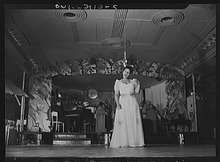Betty Roché
Mary Elizabeth Roché (January 9, 1918 – February 16, 1999)[1] was an American blues singer. Though she had a sporadic career, she became most noted for her version of "Take the "A" Train" with its composer Duke Ellington, and "was famous for her strong, dramatic way of putting across blues material".[2]
Betty Roché | |
|---|---|
 Betty Roché performing with Duke Ellington, April 1943 | |
| Background information | |
| Birth name | Mary Elizabeth Roach |
| Born | January 9, 1918 Wilmington, Delaware, United States |
| Origin | New York City |
| Died | February 16, 1999 (aged 81) Pleasantville, New Jersey, U.S. |
| Genres | Jazz, blues |
| Occupation(s) | Singing |
| Years active | 1939–1960s |
| Labels | Prestige, Bethlehem |
| Associated acts | Duke Ellington |
Biography
Roché was born in Wilmington, Delaware, as Mary Elizabeth Roach, and was raised by her grandparents in Atlantic City, New Jersey.[1] She won a talent contest at the Apollo Theater after settling in New York City in 1939, and then joined the Savoy Sultans, with whom she made her first recordings in 1941. The following year, she joined the Duke Ellington Orchestra to make the film Reveille with Beverly (1944), which also featured Frank Sinatra and Count Basie. She performed "Take the A Train" in the film, but the AFM recording ban meant that she could not make a recording of it at the time. She also sang in Ellington's performance of his "Black, Brown and Beige" suite at Carnegie Hall, but again no recordings were made at the time, and by the time Ellington was able to record it in 1944, Roché had left the band.[2][3][4]
She also sang with Lester Young and Hot Lips Page, and in the 1940s performed at Minton's Playhouse with bebop musicians including Thelonious Monk and Kenny Clarke.[2] She joined the Earl Hines band in 1944, and recorded with him, before leaving the music business for a few years. In 1951 she rejoined Ellington, and the following year recorded an extended version of "Take the A Train" on the LP Ellington Uptown, which became the song's best-known arrangement and continues to feature on compilations of Ellington's work. She settled in San Diego, California, and worked occasionally in clubs and with Charles Brown and Clark Terry. In the mid-1950s, she was part of the cast recording of The Complete Porgy and Bess.[2] She also recorded two albums, Take the A Train in 1956, and Singin' and Swingin' for Prestige Records in New York in 1960, but was unwilling to maintain a full-time career in music.[3]
Roché died in Pleasantville, New Jersey in February 1999, aged 81.[1][3]
Discography
- Take the "A" Train (Bethlehem, 1956)
- Singin' & Swingin' (Prestige, 1960)
- Lightly and Politely (Prestige, 1961)
References
- Eagle, Bob; LeBlanc, Eric S. (2013). Blues - A Regional Experience. Santa Barbara: Praeger Publishers. pp. 329–330. ISBN 978-0313344237.
- Biography by Eugene Chadbourne, Allmusic.com. Retrieved 8 November 2016
- Steve Voce, "Obituary: Betty Roche", The Independent, 23 March 1999. Retrieved 8 November 2016
- Ben Ratliff, "Betty Roche, Singer of Blues And Be-Bop, 81", New York Times, March 1, 1999. Retrieved 8 November 2016